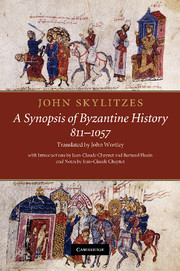Book contents
- Frontmatter
- Contents
- The English translator’s Preface
- Introduction
- Re-writing history: John Skylitzes’ Synopsis historion
- Foreword
- Chapter 1 Michael I Rangabe, the Kouropalates [811–813]
- Chapter 2 Leo V the Armenian [813–820]
- Chapter 3 Michael II the Stammerer [820–829]
- Chapter 4 Theophilos [829–842]
- Chapter 5 Michael III, the son of Theophilos [842–867], and his mother Theodora [842–862]
- Chapter 6 Basil I Kephalas, the Macedonian [867–886]
- Chapter 7 Leo VI the Philosopher (the Wise) [886–912]
- Chapter 8 Alexander [912–913]
- Chapter 9 Constantine VII, Porphyrogennetos [913–959]
- Chapter 10 Romanos I Lekapenos [919–944]
- Chapter 11 Constantine VII [944–959]
- Chapter 12 Romanos II the Younger [959–963]
- Chapter 13 Basil II Bulgaroktonos and Constantine VIII [976–1025]
- Chapter 14 Nikephoros II Phokas [963–969]
- Chapter 15 John I Tzimiskes [969–976]
- Chapter 16 Basil II and Constantine VIII bis [976–1025]
- Chapter 17 Constantine VIII [1025–1028]
- Chapter 18 Romanos III Argyros [1028–1034]
- Chapter 19 Michael IV the Paphlagonian [1034–1041]
- Chapter 20 Michael V Kalaphates [1041–1042]
- Chapter 21 Constantine IX Monomachos [1042–1055]
- Chapter 22 Theodora [1055–1056]
- Chapter 23 Michael VI the Elder/Stratiotikos [1056–1057]
- Glossary
- Bibliography
- Index
- References
Chapter 14 - Nikephoros II Phokas [963–969]
Published online by Cambridge University Press: 05 July 2014
- Frontmatter
- Contents
- The English translator’s Preface
- Introduction
- Re-writing history: John Skylitzes’ Synopsis historion
- Foreword
- Chapter 1 Michael I Rangabe, the Kouropalates [811–813]
- Chapter 2 Leo V the Armenian [813–820]
- Chapter 3 Michael II the Stammerer [820–829]
- Chapter 4 Theophilos [829–842]
- Chapter 5 Michael III, the son of Theophilos [842–867], and his mother Theodora [842–862]
- Chapter 6 Basil I Kephalas, the Macedonian [867–886]
- Chapter 7 Leo VI the Philosopher (the Wise) [886–912]
- Chapter 8 Alexander [912–913]
- Chapter 9 Constantine VII, Porphyrogennetos [913–959]
- Chapter 10 Romanos I Lekapenos [919–944]
- Chapter 11 Constantine VII [944–959]
- Chapter 12 Romanos II the Younger [959–963]
- Chapter 13 Basil II Bulgaroktonos and Constantine VIII [976–1025]
- Chapter 14 Nikephoros II Phokas [963–969]
- Chapter 15 John I Tzimiskes [969–976]
- Chapter 16 Basil II and Constantine VIII bis [976–1025]
- Chapter 17 Constantine VIII [1025–1028]
- Chapter 18 Romanos III Argyros [1028–1034]
- Chapter 19 Michael IV the Paphlagonian [1034–1041]
- Chapter 20 Michael V Kalaphates [1041–1042]
- Chapter 21 Constantine IX Monomachos [1042–1055]
- Chapter 22 Theodora [1055–1056]
- Chapter 23 Michael VI the Elder/Stratiotikos [1056–1057]
- Glossary
- Bibliography
- Index
- References
Summary
[Nikephoros] despatched the synkellos, a Stoudite monk named Anthony, to expel Theophano from the palace and sent her to the Petrion palace. Shortly after that he sent Joseph the parakoimomenos into exile in Paphlagonia then, before long, transferred him to a monastery known as Asekretis in Pythia [Thessaly] where he lived for two whole years and then died. [Nikephoros] also promoted his own father, Bardas, to the rank of caesar.
On 20 September he put aside all pretence and play-acting by taking Theophano to be his lawful wife. It was then that he started eating meat again; he had been abstaining from it ever since the death of Bardas, the son born to him by his first wife. This son had been horse-riding on the plain, sporting with his own nephew Pleuses, when he was accidentally but mortally wounded with a spear. Only Nikephoros and God know whether this was really an abstinence or merely an affectation to deceive those in power. The marriage was celebrated at the New Church in the palace. When it came to the point of entering the sanctuary, Polyeuktos, leading the emperor by the hand, approached the sacred enclosure and entered the sanctuary himself but forced the emperor to remain outside, saying that he would not allow him to enter the sanctuary [261] until he had performed the penance required of one who marries a second time. This offended Nikephoros and he never ceased being indignant with Polyeuktos until the day of his death. Now a rumour went out in all directions, a rumour that disturbed the church in no small way, that Nikephoros had stood godfather for one of Theophano’s children at his holy baptism. Taking this rumour as an opportune pretext, Polyeuktos demanded that Nikephoros either separate from his wife (as the canon required) or that he stay away from church – which in fact he did, cleaving to Theophano. Polyeuktos summoned the bishops residing in the city together with the leading senators and invited their opinion on this matter.
- Type
- Chapter
- Information
- John Skylitzes: A Synopsis of Byzantine History, 811–1057Translation and Notes, pp. 250 - 270Publisher: Cambridge University PressPrint publication year: 2010

